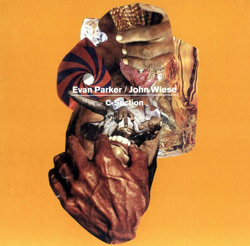
Have you ever witnessed a Cesarean section? It is not a pleasant experience: as if spending hours with a nurse, pushing and pulling, breathing abnormally and gritting teeth against excruciating pain, sleep deprivation and tubes jammed in veins weren't enough, the mother is put under the gas and sliced open (a scar that will forever ruin bathing suit season). And the result? Well it would be wonderful if you hadn't just seen it ripped out of a bloody stomach and it wasn't kicking, screaming and covered in various filth bearing names such as "meconium" and other words you had previously never heard. (Note: this fatherly observation might be less piercing with the second child.)
Aptly named, this collaboration between Evan Parker and noise-maven John Wiese explores the messy question "what would happen if two of the loudest, most intense heavyweights of their respective genres met?" With Parker on soprano and tenor sax and Wiese on "electronics, tape, (Max) MSP", they give birth to an intense collection of unhinged and mutilated tones, all set on display in a nursery of sonic freaks. Without much formal development or regard for each other's maelstrom, the duo galumphs through four works — two sprawling, two miniscule. Wiese spatially pans skronks, gurgles, blizzards of shards, demolitions, microphone rattles, snippets of yelps, occasional pulses and humming distortion while Parker dances his soprano over the wreckage (though the latter's sound source is most likely the obscured culprit and inspiration for Wiese's mayhem, the relationship isn't apparent). Despite the absence of internal cohesion, the palettes both men smear are terrific and compelling enough to make up for the lack of conversation at this disjuncture. However, when they do come together, the consummation is just as exciting: on "Little Black Book" and "No Shoes", Wiese follows Parker's hyperactive riffs with buzzing feedback then dizzies the tracks with real-time multitracked loops of the sax player's performance. But those seven minutes are fleeting, and a 24-minute closer named "Dog Cesarean" should be a brawl, not a handshake. The duo butt heads in an even more anarchic fashion, Wiese opening up Max folders titled "metallic destruction" to nearly overpower Parker's circular breathing machine. Near the climax, they adopt a completely bi-polar approach, Parker turning soulful as Wiese fires off his biggest artillery. The work hits the pinnacle, and, unable to scale any further, the music implodes and fades into a ghostly reverb tail.
Not simply a frippery of brutality and experimentation for the sake of being loud and obtuse, this epiphanic display by Parker and Wiese is unparalleled — though perhaps not something immediately embraced by fans at the purist end of either camp. To those on the fence, feel free to run, vomit, gasp, but come back, hands over your face with one squinting eye and you will learn to love this exhilarating, sublime, endearing monstrosity.
Comments and Feedback:
|



